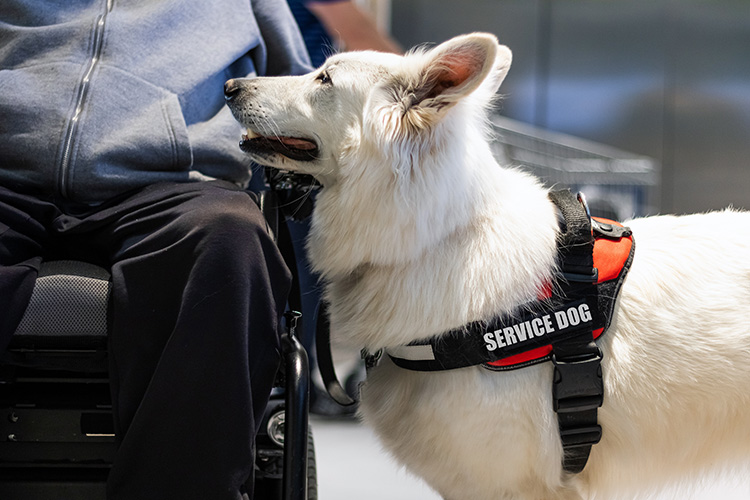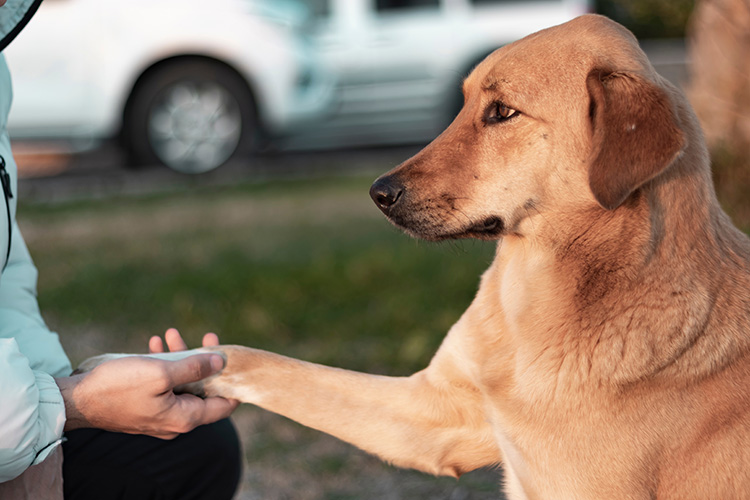If you or someone you know is considering getting a psychiatric service dog, you know that it is a big commitment. A psychiatric service dog requires a massive amount of time and money to train in advance, and a commitment to care for it once you have it. There are a variety of advantages and disadvantages to owning one. Here is what living with a psychiatric service animal is actually like.
What is a Psychiatric Service Dog?
A psychiatric service dog is defined as a dog who is trained to do specific tasks in relation to their owners mental health or disability. They are protected under the Americans with Disabilities Act (ADA) as necessary medical equipment. They differ from emotional support animals in that they are trained to do certain tasks, while emotional support animals simply provide comfort through their presence. Emotional support animals also cannot travel with you or go in public with you the way a psychiatric service dog can, because they are only protected by the Fair Housing Act. They also differ from traditional service animals who are trained to do tasks for those with physical disabilities or illnesses.
What Does a Psychiatric Service Dog Do?
Psychiatric service dogs can be trained to do a variety of tasks in relation to your mental illness. These tasks can include reminding you to take your medication at the correct time, waking you up from nightmares, stopping self-harming or OCD behaviors, interrupting PTSD flashbacks, standing on top of you to hit certain pressure points when you are having a panic attack, and more. These dogs must also be trained to be calm and well behaved, even in chaotic and loud environments, such as airports.
Things You will Experience Daily with a Psychiatric Service Animal
- Attention from the public
Both you and your psychiatric service dog may receive unwanted attention when you head out in public. That may come in the form of irritable shop owners asking why you are bringing a dog into their store, children running up and wanting to pet the dog, or people asking why you need a service dog when you seem healthy and able-bodied to them. If you get a psychiatric service dog, you must be mentally prepared to deal with these various situations. Your service dog must also be trained to be calm and well-behaved, even in chaotic and loud places with strange people.
- Daily time commitment
Having an animal is a big daily responsibility. You must provide it with food, water, exercise, stimulation, attention, and love. It will also need regular veterinary appointments, and may sometimes get sick and require medical treatment. All these things can be costly and time consuming. It is important to make sure you are financially, physically, and mentally able to probably care for a dog before getting a psychiatric service dog.
- Service dogs have bad days too
Even the best trained service dogs in the world have bad days too. They can get sick, tired, or grumpy just like us. They may get distracted, act up, and you may have to leave them home or stay home with them. This should be a rare occurrence, as reliability is an important quality to have in psychiatric service dog, but it can still happen sometimes.
- Planning ahead is a must
If you are traveling, or even just going out with a service animal, planning is a must. You must plan bathroom breaks for them, food, treats, water, and everything else. If you are traveling, you must also make sure you have all the necessary paperwork with you and meet any requirements laid out for you.
As show, there are many aspects of life with a psychiatric service dog that require a lot of time, money, and preparation. It is important to consider what daily life will look like with the addition of service dog before you commit to getting one. To get a psychiatric service dog, you will also need a letter of certification written by a licensed mental health or medical professional. You can get one quickly and easily from our experts at United Support Animal at 800-918-3151 or by taking our pre-screening test.




